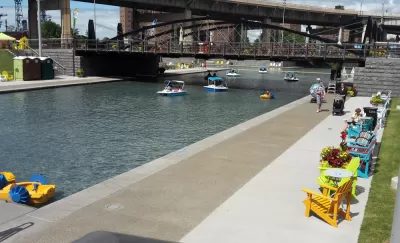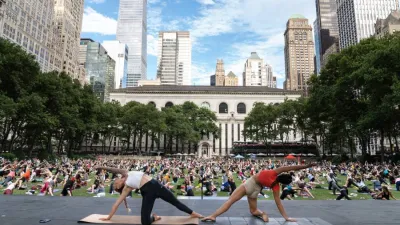New qualitative research into three example public spaces in the United States offers best practices and obstacles to avoid in the placemaking process.

Nate Storring, deputy director of Project for Public Spaces, writes for the Brookings Institution blog, The Avenue, to provide a list of "takeaways" generated by a recent qualitative study into the holistic effects of three public spaces in the United States.
The research in question is a recent entry in the Bass Center for Transformative Placemaking research series titled "Beyond traditional measures: Examining the holistic impacts of public space investments in three cities." Researchers Hanna Love and Cailean Kok qualitatively examined public spaces in Flint, Mich., Buffalo, N.Y., and Albuquerque, N.M. "to shed new light on these questions and chart a path forward for more equitable and effective placemaking," explains Storring.
Storring focuses on four main takeways from the research, with more detail included in the source article below:
- Public space for 'everyone' don't work for everyone.
- Placemaking needs thoughtful place governance to sustain itself
- When it comes to money, 'how' sometimes matters more than 'how much'
- The future of public spaces is qualitative
On this last point, Storring notes that the groundbreaking observational research techniques pioneered by William H. Whyte and Jan Gehl "to track the number and kinds of people in a space and how they use it" offer a baseline of research that nevertheless fails to capture key issues, such as public perception, interpersonal interactions, and broader benefits to public health, the economy, and the environment. "Since then, academic research on public spaces has continued to evolve, with a growing emphasis on qualitative techniques," according to Storring.
FULL STORY: Four takeaways on public space investment for placemakers

Planetizen Federal Action Tracker
A weekly monitor of how Trump’s orders and actions are impacting planners and planning in America.

The Simple Legislative Tool Transforming Vacant Downtowns
In California, Michigan and Georgia, an easy win is bringing dollars — and delight — back to city centers.

San Francisco's School District Spent $105M To Build Affordable Housing for Teachers — And That's Just the Beginning
SFUSD joins a growing list of school districts using their land holdings to address housing affordability challenges faced by their own employees.

In More Metros Than You’d Think, Suburbs are Now More Expensive Than the City
If you're moving to the burbs to save on square footage, data shows you should think again.

The States Losing Rural Delivery Rooms at an Alarming Pace
In some states, as few as 9% of rural hospitals still deliver babies. As a result, rising pre-term births, no adequate pre-term care and "harrowing" close calls are a growing reality.

The Small South Asian Republic Going all in on EVs
Thanks to one simple policy change less than five years ago, 65% of new cars in this Himalayan country are now electric.
Urban Design for Planners 1: Software Tools
This six-course series explores essential urban design concepts using open source software and equips planners with the tools they need to participate fully in the urban design process.
Planning for Universal Design
Learn the tools for implementing Universal Design in planning regulations.
Smith Gee Studio
City of Charlotte
City of Camden Redevelopment Agency
City of Astoria
Transportation Research & Education Center (TREC) at Portland State University
US High Speed Rail Association
City of Camden Redevelopment Agency
Municipality of Princeton (NJ)





























